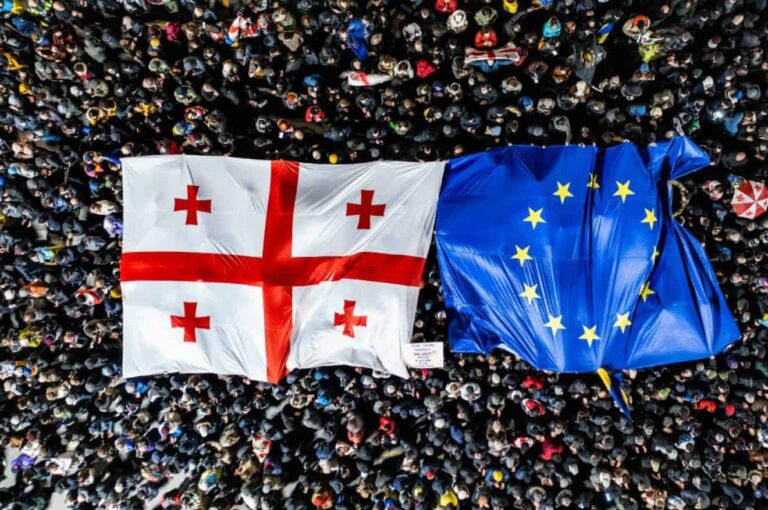Georgia has risked to move away from the European Union and to take a step in the direction of Vladimir Putin’s Russia.
The Tbilisi parliament had given an initial green light to a law introducing a registry of organizations considered to be “agents of foreign influence“. This is a controversial formula already used by Moscow and some allied countries to target domestic opposition, media and civil society not aligned with the Kremlin on charges of alleged espionage.
The approval triggered a new wave of protests by pro-EU Georgians, who rallied overnight in the capital.
Table of Contents
Protests in Georgia against government’s approach to Putin
Protesters sang Georgia’s national anthem and waved EU and Georgian flags, while police in riot gear fired tear gas, water cannons, and used pepper spray to disperse the crowd.
“Down with Russian law,” protesters shouted. According to a recent poll, 80 percent of the Georgian population supports the country’s accession to the European Union.
After Russia’s aggression in Ukraine, Georgia, which had been invaded by Moscow’s troops in 2008, applied for candidate status to join the bloc, on par with Ukraine and Moldova. But Brussels met the request only partially, proposing that Tbilisi implement a series of reforms before formally gaining the status.
Georgia’s position between European and Russian influence
In contrast, the response of the ruling party, Georgian Dream, which on paper is in favor of EU membership, went in the opposite direction.
Its leader, Irakli Kobakhidze, has pursued a policy of détente with Russia, with the stated aim of avoiding a dangerous war with Moscow. In reality, according to criticians, Kobakhidze is trying to deflect attention from demands for EU reform, including the one on oligarchs.
Such a law would, for example, strike at the interests of former Prime Minister Bidzina Ivanishvili, who is considered by the opposition to be the puppet master behind Georgian Dream, a party he founded. “Ivanishvili, whose assets account for more than 20 percent of Georgia’s entire economic output, earned billions in Russia before becoming Georgian prime minister”.
The oligarch is reportedly acting in the shadows to stop the country’s process of moving closer to the EU. In contrast, his successor, the young Kobakhidze, who studied in Germany, is doing so with a straight face.
Thousands of Russians are moving to Georgia after the outbreak of the war
Since the war in Ukraine began, tens of thousands of Russians have moved to Georgia. Last September alone, 220,000 Russian citizens reportedly arrived in the country. For Georgian Dream, these are refugees fleeing the war.
But at the same time as their arrival, the number of Russian companies set up in Georgia has also increased abruptly. By the end of 2022 there were about 13 thousand. Half of which opened in the aftermath of the invasion in Ukraine.
According to the opposition, the long hand of the Kremlin, which already controls the territories of Abkhazia and South Ossetia since the 2008 war, could be behind this flow.
According to Natia Seskuria, founder and director of the Georgia-based Regional Institute for Security Studies (Riss), the Russian migrants could be “agents of influence”. Or, more simply, Russian spies, sent to the country to pave the way for Moscow’s eventual military intervention.
No foreign agent law: the Parliament takes a step backward after harsh protests
The Georgian parliament has finally revoked the foreign agents law, reports the Georgian office of the Russian radio network Sputnik.
“As a responsible governing party, we made the decision to unconditionally withdraw the bill we had supported”. Said the Georgian Dream party, which holds an absolute majority in parliament.
The decision follows two nights of clashes in the capital Tbilisi, where thousands of protesters demanding the law’s revocation had gathered in front of parliament.
According to the budget provided by the Interior Ministry, police detained 133 people. While dozens of officers and civilians were injured.
The EU response states: “We welcome the ruling party’s announcement to withdraw the Foreign Influence Bill. We encourage all Georgian political leaders to resume pro-EU reforms in an inclusive and constructive manner and in line with Georgia’s twelve priorities for achieving candidate status.”
Read also: Sweden and Finland in NATO, the last two hurdles for the Nordic countries to join the Alliance












